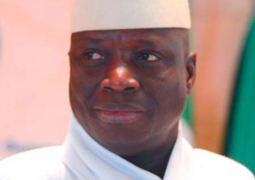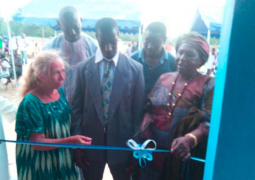In an interview with this correspondent following the recent
Presidential elections in Ghana hailed by the international community and
various independent observers as free, fair and transparent, the Deputy High
Commissioner said: 'The right people should be positioned in the right place in
order to achieve fairness. The Electoral Commissioner in
Following the elections in December 2008, none of the
candidates was able to secure more than 50 percent of the votes cast for an
outright victory as required by the Ghanaian constitution. Therefore a run-off
election took place two weeks ago and Professor John Atta Mills, presidential
candidate of the opposition National Democratic Congress (
Observers said that even though
Asked by this correspondent how his country was able to achieve such progress in the face of lots of scepticism and uncertainty, Deputy High Commissioner Zed Grant Essilfie said: 'Political maturity, justice, an Electoral Commissioner trusted by all contestants as well as the nature of brotherhood of the Ghanaians also contributed to such success. He also stressed: 'It takes a lot to make a Ghanaian angry or use violence. They are hospitable, nice, accept criticisms and can solve many situations through dialogue rather than resort to violence'.
The Deputy High Commissioner also indicated that other African countries can learn from the Ghanaian example and that efforts made by his government over the years include not only public education but also 'general enlightenment, tolerance, political maturity and a level playing field'.
Prior to the conducting of the interview, this correspondent
had an informal meeting with certain Ghanaians in
The Ghanaians were keenly and intensely following the
political campaign in their country including debates conducted in various
newspapers and magazines as well as independent West African television
channels in the
This correspondent also covered the 2000 presidential
election in the West African country of
However some of the Ghanaians expressed concerns over the previous government's 'last minute decision' before handing over power to the opposition by 'increasing salaries and granting amnesty to many Ghanaian officials' including some allegedly accused of 'committing wrong doings' in the past. They expressed fear that such 'blanket amnesty may cause negative precedent that could lead to public officials operating with impunity'.
Interestingly former President Jerry Rawlings was also in the spotlight and his supporters said that despite all the criticisms they were happy to see the way he was welcomed by the crowd when the party to which he belongs won, a sign of appreciation to the former leader. Others totally disagree causing one of the debaters to walk-away for a while.
The Ghanaians also told The Point that they were glad for such maturity including the fact that there were no reported cases of 'thuggery, fraud, malpractices or other electoral-related violence before, during, or after the elections' adding that both 'the army, the police and other law-enforcement agents were neutral'.
It was due to such neutrality from members of the security forces, the Ghanaians believe had prevented unnecessary 'provocation of violence' and that there were 'no arrogant or provocative statements' delivered by political opponents to give rise to any unfortunate situation. As a result they asserted that they can now raise their heads high even though they are still living abroad.
When questioned about such claims of amnesty, the Deputy High Commissioner stressed the need for 'reconciliation and national unity' with the conviction that it is the duty of any responsible government to make sure that the people are united at all cost. At the same time, he stressed the necessity to ensure that justice takes its course which he said is essential to avoid people to feel disaffected.
Deputy High Commissioner Zed Grant Essilfie said: 'Such
principle is desirable in a fair society, both the previous and current
presidents of
Pressed further on the issue, he maintained: 'To the contrary we are not in any way trying to ignore justice. Social reconciliation is important in a democracy and that is exactly what we are doing'. He also indicated the other African countries especially those from the sub-region could learn such lessons from the Ghanaians adding that many African countries are in the 'learning process' and hope that such kinds of fair and peaceful elections can continue in the continent.
Regarding a personal question on what he thinks may be causing the delay of the West African Monetary Union since this correspondent was told by senior West African bank official in Accra, in the year 2000 during a press conference that a common monetary union was a vision to be achieved by 2003, the Deputy High Commissioner responded that he was aware that there was delay in its existence.
He said: 'There was a delay due to certain budgetary and economic issues and therefore was postponed for a while'. However he said he supported the idea because 'unitary issues are no longer attractive' in the modern world. Many nations he said are now trying to be closer to each other for both political and economic interest and therefore the West African sub region is not an exception. He added: 'The bigger your market, the bigger your economy, personally I am really in support of it'.
Asked if he was sure to continue to stay in London or whether he is in the process of packing his bags as the government he was serving lost the elections, the Deputy High Commission humbly disclosed: 'I am a career diplomat so I was not just appointed.
Taking into consideration my work description, I can work with any government that requires my service. Beside I am a very contented person and prepared to accept whatever comes my way'.
Regarding the transition, he also revealed to The Point that an open and peaceful transition is underway as the two parties are working closely to that effect. Deputy High Commissioner Zed Grant Essilfie also used the opportunity to wish The Point and its readers a happy new year.



